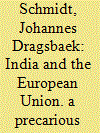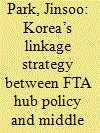|
|
|
Sort Order |
|
|
|
Items / Page
|
|
|
|
|
|
|
| Srl | Item |
| 1 |
ID:
145003


|
|
|
|
|
| Summary/Abstract |
The European Union (EU) and Japan have held annual bilateral summits since 1991; however, little cooperation has been achieved between the two parties. The existing literature on summitry meetings fail to account for this puzzling observation. This dissertation instead argues that the symbolic aspects of summits are the driving force behind the rise and continuation of EU-Japan summits because they essentially indicate the status of the EU and Japan in international relations.
|
|
|
|
|
|
|
|
|
|
|
|
|
|
|
|
| 2 |
ID:
145005


|
|
|
|
|
| Summary/Abstract |
The introduction of the “strategic partnership” between India and the EU in 2004 was an attempt to gradually deepen and institutionalize diplomatic relations and cooperation between the two entities within a number of areas such as multilateralism, security and human rights, enhancement of commercial and economic exchanges, sustainable development, climate change and poverty, and promotion of interactions at the civil society level. A joint action plan was later signed, but the relationship has not yet evolved into a strategic level between two equal partners. Seen from both sides, there are inadequacies and inconsistencies in the way the partnership is being conducted. There are serious complaints especially from India’s perspective about the dialogue itself and a lack of deep and serious commitment to move beyond the obvious and in some cases what is described a patronizing tone from EU delegations. This paper gives an overview of recent developments in the relationship with an emphasis on the period since the beginning of the European sovereign debt crisis and the simultaneous global shift away from geo-economics towards geo-politics. It utilizes a critical international political perspective which gives a coherent understanding of the interaction between what looks like a “normal” trade and investment relationship but what in reality appears as mercantilism mixed up with history, culture and politics. Adding to these difficulties are a number of domestic constraints which complicate the relationship.
|
|
|
|
|
|
|
|
|
|
|
|
|
|
|
|
| 3 |
ID:
145006


|
|
|
|
|
| Summary/Abstract |
The paper scrutinizes the spillover effects of expansionary monetary policies of a center economy to the macroeconomic policies of periphery countries, dependent on the exchange rate regime. In particular, the impact of the US quantitative easing on the Chinese economy is analysed. The results suggest that the exchange rate regime plays a minor role in insulating the economies at the periphery of the world monetary system from monetary policy shocks in the center. Capital controls, on the other hand, enable the periphery countries, in particular China, to maintain a certain degree of monetary independence in the short run. In the long run, a closer Chinese–European policy coordination is argued to create a counterbalance to the predominance of the US dollar in the currently asymmetric world monetary system. This would provide an incentive to the USA to phase out undue monetary expansion.
|
|
|
|
|
|
|
|
|
|
|
|
|
|
|
|
| 4 |
ID:
145000


|
|
|
|
|
| Summary/Abstract |
This article focuses on Korea’s free trade agreement (FTA) hub policy and its implication for Korea’s role in the regional integration process of the Asia-Pacific. It particularly bridges a gap in the existing literature, addressing why Korea, pursuing an FTA hub nation, simultaneously takes a proactive approach toward a range of regional projects. It argues that Korea’s FTA hub policy has not been solely driven by economic consideration, and the Korean government’s intent to use an FTA hub status to gain political objectives is equally, or even more, important. In particular, Korea has linked its FTA hub policy and the exercise of middle power leadership in the shaping of the regional trade architecture. The Korean government has perceived Korea’s FTA hub status as a useful instrument for Korea’s leading roles such as facilitating regional trade liberalization, managing its manners and sequence, and mediating between the USA-led and the China-led regional initiatives.
|
|
|
|
|
|
|
|
|
|
|
|
|
|
|
|
| 5 |
ID:
145004


|
|
|
|
|
| Summary/Abstract |
Australia has historically been perceived as a state of limited direct relevance to European Union (EU) interests. This perception was influenced to a significant extent by disagreement over the EU’s Common Agricultural Policy (CAP) and the obvious geographical distance that exists between the EU and Australia. Beginning with the 1990s, this article will argue, however, that the EU’s decision to make a conscious effort to increase engagement with the Asia-Pacific region during this period has seen Australia become an international partner of increased relevance. During the 1990s, the EU slowly became more cognisant of the extent to which it had a commonality of values and interests with Australia in the Asia-Pacific region. This recognition facilitated increased cooperation on regional issues over subsequent decades on issues such as trade, security, development assistance and the promotion of regional integration. This article draws on interviews with EU and Australian officials to demonstrate the extent to which close cooperation on Asia-Pacific issues is taking place. Moreover, it will also argue that the extent of shared interests and cooperation with respect to the Asia-Pacific region has been reflected in the signing of a Partnership Framework agreement in 2008 and the current negotiations for a Framework Agreement. These agreements indicate how a shared recognition of norms and values in the Asia-Pacific region has resulted in Australia becoming an increasingly important partner of the EU.
|
|
|
|
|
|
|
|
|
|
|
|
|
|
|
|
| 6 |
ID:
145007


|
|
|
|
|
| Summary/Abstract |
There are regional fears that Beijing will use its growing clout to embark on an aggressive, expansionist policy in International Relations, hence the possibility of a collision course with the USA reminiscent of how Anglo-German tensions at the beginning of the twentieth century escalated into World War One. Closer scrutiny, however, suggests grounds for downplaying the likelihood of such a scenario. We outline this argument based on the following points: (i) there is a much higher level of economic interdependence between China and the USA today, compared to Britain and Germany, (ii) the corresponding levels of nationalism in China and the USA are lower than in Britain and Germany, (iii) the political alignments of international relations in the Asia Pacific in 2014 are less ambiguous than those in Europe in 1914, hence less potential for diplomatic miscalculation and (iv) the military and economic instruments of power that the USA and China possess, by being far more lethal than those held by Britain and Germany in 1914, would render any conflict between them an unacceptably costly catastrophe.
|
|
|
|
|
|
|
|
|
|
|
|
|
|
|
|
| 7 |
ID:
145001


|
|
|
|
|
| Summary/Abstract |
This paper analyzes the process of policy convergence between the European Union (EU) and Korea with respect to regulating chemicals. Its framework for policy convergence includes international and domestic influences on why and how policy convergence occurs, what is transferred, and what risks are involved. The following findings flow from the case study analysis. First, policy convergence between Korea and the EU has occurred not only due to external factors such as diffusion and regulatory competition but also due to internal factors including concerns about competitiveness and domestic environmental and health accidents relating to chemicals. Second, policy convergence between Korea and the EU results in many similarities, but differences as well. Similarities between Act on the Registration and Evaluation of Chemicals (AREC) and the Regulation of Registration, Evaluation and Authorization of Chemicals of the EU (EU REACH) show that chemical control would be strengthened as the end result of policy convergence. On the other hand, the differences between AREC and EU REACH imply that policy from the EU was adjusted in Korea in response to domestic conditions. This policy adjustment creates risks that can weaken the original purpose of policy and possibilities that can strengthen it. Lastly, despite adjustments that weakened some components of chemical controls, policy convergence between the EU and Korea results in Korean society entering a new phase of managing chemicals for a safer society.
|
|
|
|
|
|
|
|
|
|
|
|
|
|
|
|
| 8 |
ID:
144999


|
|
|
|
|
| Summary/Abstract |
Both Germany and Korea have recently attempted to improve their positions in worldwide university rankings, introducing major reforms with the aim of funding research clusters and groups. Additionally, Germany has opted to introduce elite universities and junior professorships. The THE-QS World University Rankings, a compilation published from 2004 to 2009, provides some evidence that the mean ranking of German universities did not improve during the observed period. This paper tentatively suggests that this may be due to the fact that Germany is lacking a publish-or-perish promotion system spanning the period from graduation to tenure. In contrast, Korea has implemented a number of “big-push” reforms such as mandatory English curricula, foreign professorships, and foreign-student quotas, all of which have apparently resulted in a massive “brain gain.” In addition, the Korean government’s efforts to make publications in acknowledged journals compulsory have dramatically improved Korea’s research output and apparently contributed to its sharp rise in the THE-QS World University Rankings. Though Korean universities surpassed German ones on average in the short run, the effects of the German academic reforms await further ranking evidence in the long run. Further drawbacks and advantages of the system in Korea and Germany are critically discussed.
|
|
|
|
|
|
|
|
|
|
|
|
|
|
|
|
|
|
|
|
|